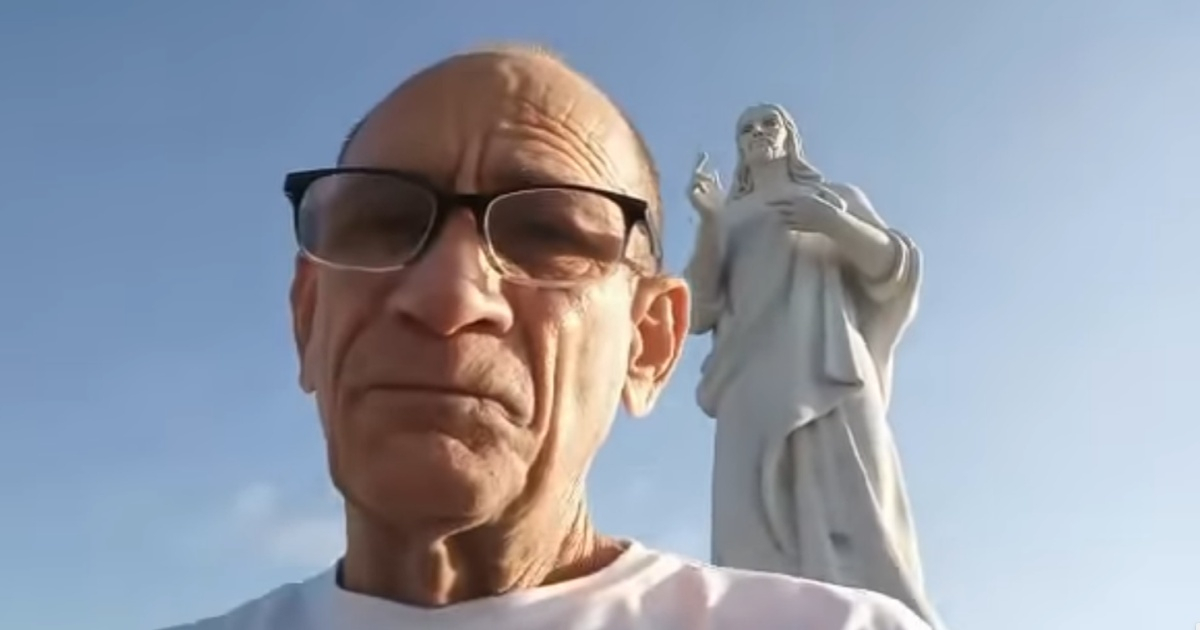Amnesty International (AI) has officially recognized Cuban professor and political activist Pedro Albert Sánchez as a prisoner of conscience, urging President Miguel Díaz-Canel Bermúdez to release him "immediately and unconditionally." The non-governmental organization made this announcement on Monday, just before the third anniversary of the historic protests that took place on July 11 and 12, 2021, in Cuba. Alongside this declaration, AI released a statement demanding the regime "free all individuals unjustly imprisoned merely for exercising their rights to freedom of expression and peaceful assembly."
Among those mentioned were prisoners of conscience such as opposition leader José Daniel Ferrer García, artists Luis Manuel Otero Alcántara and Maykel Osorbo, and Yoruba priests Loreto Hernández García and Donaida Pérez Paseiro.
The AI statement highlighted that Professor Albert, aged 68, is well-known for his criticisms of the Cuban regime and his advocacy for freedom of speech and peaceful assembly. Since 2020, he has been detained multiple times for participating in peaceful protests and expressing dissenting opinions.
For his peaceful participation in the July 11 protests, the regime charged him with "disrespect" and "public disorder," resulting in a five-year prison sentence. Amnesty International condemned that since November 2023, Professor Albert has been held in "harsh conditions that have further deteriorated his health, as he suffers from cancer and other ailments." On July 7, the organization issued an urgent action call, urging people worldwide to demand his immediate and unconditional release.
AI's statement further warned that the Cuban state must stop its systematic repression against activists, artists, families of political prisoners, intellectuals, and journalists. As part of this, they called for the repeal of penal code articles that criminalize dissent and violate the right to freedom of expression.
Ana Piquer, Amnesty International's Americas director, condemned the Cuban authorities' ongoing use of repressive tactics to silence those who dare to speak out in defense of human rights. She described this continuous repression as "unacceptable" and stressed that it must come to an end.
The NGO noted that the human rights situation in Cuba continues to worsen, with increasing repression and criminalization of dissent. They pointed out that since the regime implemented new legal provisions in 2022, including the Penal Code, there has been a documented misuse of these laws to persecute individuals seeking to freely exercise their rights.
AI denounced the authorities' systematic practices, including the use of "repressive tactics such as criminalization, arbitrary detentions, de facto house arrests, harassment, summonses, and administrative sanctions against activists, journalists, and human rights defenders, as well as internet shutdowns in locations of spontaneous protests."
One of the most notable cases is that of Ferrer, who has suffered solitary confinement multiple times since August 2021, with prolonged periods of incommunicado detention since March 17, 2023. His right to family visits has been repeatedly denied.
AI also highlighted the human rights violations against individuals like young Mayelín Rodríguez Prado, activist Wilber Aguilar Bravo, musician Gorki Águila, journalist Yuri Valle Roca, and historians Alina Bárbara López and Jenny Pantoja, calling them "examples of a systematic pattern of repression in Cuba, where freedom of expression and peaceful assembly are severely restricted."
Johanna Cilano Pelaez, regional researcher for the Caribbean at AI, emphasized that the number of individuals unjustly imprisoned and repressed for political reasons demonstrates the urgent need to dismantle the policies and legal framework that facilitate repression in Cuba. "Many of these individuals remain behind bars solely for exercising their right to free expression. Their immediate and unconditional release and the respect for their right to dissent are essential to guaranteeing human rights in the country," she warned.
Amnesty also pointed out that over the past three years, organizations such as Justicia 11J, Prisoners Defenders, and the Cuban Observatory of Human Rights have documented between 963 and 1,113 people detained for political reasons in Cuba. Among them, at least 671 remain imprisoned for their participation in the July 11 uprising.
"The protests in Cuba, driven by a persistent economic crisis, lack of access to basic services, and demands for freedom and rights, have been met with a sophisticated repressive machinery," AI stated, calling on the Díaz-Canel regime to respect the right to peaceful protest, end repression against dissenters, and release individuals unjustly imprisoned for demanding human rights.
Key Questions About Amnesty International's Declaration
In light of Amnesty International's recent announcement regarding Professor Pedro Albert Sánchez, here are some key questions and answers that provide further insight into the situation and its implications.
Who is Pedro Albert Sánchez?
Pedro Albert Sánchez is a Cuban professor and political activist known for his criticism of the Cuban regime and his advocacy for freedom of speech and peaceful assembly.
Why has Amnesty International declared him a prisoner of conscience?
Amnesty International has declared Pedro Albert Sánchez a prisoner of conscience because he has been unjustly imprisoned for exercising his rights to freedom of expression and peaceful assembly.
What conditions is Pedro Albert Sánchez currently facing in prison?
Pedro Albert Sánchez is reportedly being held in harsh conditions that have deteriorated his health, as he suffers from cancer and other ailments.
What actions has Amnesty International called for?
Amnesty International has called for the immediate and unconditional release of Pedro Albert Sánchez and other unjustly imprisoned individuals, urging people worldwide to demand their freedom.
